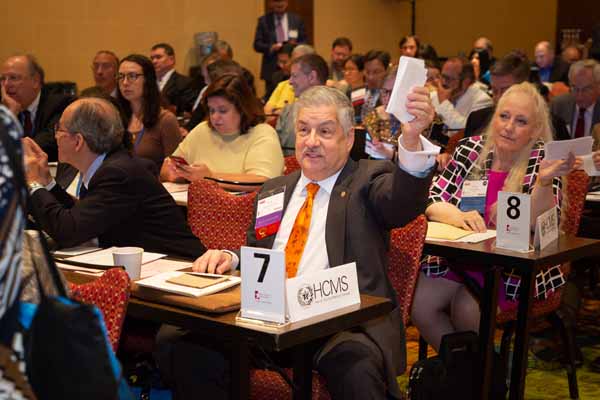
The Texas Medical Association House of Delegates worked to recover the time and authority that insurance authorization and preauthorization requirements have increasingly taken from the state’s physicians.
During TexMed 2018 in San Antonio on Saturday May 19, delegates listened to a volley of doctors’ points on a resolution to compensate physicians for time spent meeting insurance companies’ demands. They also passed a resolution stating that only physicians licensed in Texas can make medical necessity decisions.
During debate on the compensation resolution, Ori Hampel, MD, author of the measure, spoke vehemently against the authorization requirements of insurers and third-party payers. He said adopting the resolution would send a strong message to the insurance companies.
“We’ve been abused repeatedly," the Houston urologist said. "Since a similar resolution was made a year ago, the abuse has worsened in my office and in every single other office. I don’t want to do authorizations. Most of them are unnecessary. [I want to] free up my time, free up my staff’s time taking care of patients.”
Dallas public health physician John Carlo, MD, chair of the TMA Council on Socioeconomics, asked the house to take a more cautious approach.
“I’m not against this principle at all. … I just worry that we have unintended consequences that are going to be written into this draft,” he said.
The resolution would base the fee schedule for compensation on CPT codes for patient evaluation and management. Physicians and/or their staff would track the time spent on authorization and preauthorization and round it up to the nearest five-minute increment.
Delegates ultimately referred the resolution to the Board of Trustees for action.
However, the house approved another resolution that takes aim at peer-to-peer conversations that health insurers require for certain treatments.
Under the resolution, TMA would work to align the Texas Occupations Code, Insurance Code, and Administrative Code with clear language that says medical necessity decisions are the practice of medicine and can be performed only by a physician licensed in Texas. The resolution also seeks clear language that doctors making peer-to-peer decisions be of the same specialty as the treating physician seeking authorization.
Working Against Medicaid Work Requirements
Delegates also came out against patient work requirements for Medicaid in the form of a resolution authored by San Antonio pediatrician Ryan Van Ramshorst, MD.
The resolution, directs TMA to “apply all appropriate resources to oppose Medicaid work requirements” in order to protect medical services for vulnerable, low-income adults with children and other Medicaid-covered populations. The resolution also aims to avoid an increase in uncompensated physician care.
During testimony, Dr. Van Ramshorst pointed out the increased cost that would be associated with a work requirement.
“Implementing work requirements would require ... the [Texas] Health and Human Services Commission to hire additional staff, and will take additional taxpayer dollars to track this information,” said Dr. Van Ramshorst, chair of TMA’s Select Committee on Medicaid, CHIP, and the Uninsured.
He also noted that Texas Medicaid does not cover able-bodied adults.
The house passed the resolution in response to the Centers for Medicare & Medicaid Services guidance to allow states to pursue Medicaid work requirements for adults who aren’t pregnant, disabled, or seniors. TMA’s resolution says imposing work requirements “constitutes the creation of unnecessary state bureaucracy and red tape for both low-income patients and their physicians, as well as barriers to accessing health care.”